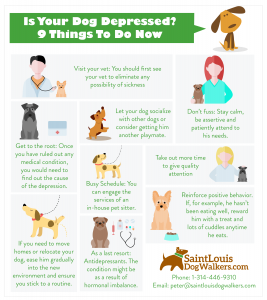Is Your Dog Depressed? 8 Things to Do Now
As emotional beings, dogs can sometimes suffer from depression which can be triggered by different factors. Depression in dogs isn’t difficult to notice and as an owner, you should be able to observe the signs so that the cause can be addressed before it poses a threat to your dog’s life.
When a dog is going through a bout of depression, you may observe behavioral changes such as:
- A Lack of enthusiasm and unwillingness to play
- Excessive sleeping
- Pacing as a result of restlessness
- Weight loss due to poor eating
- Weight gain due to lethargy or binging
- An Increase in household accidents
- Aggressiveness or Destructive behavior or
- Avoidance and hiding
- Paw licking or chewing
Physical signs that may also indicate depression in your dog include
- Sluggish movement
- Sad or squinty eyes
- Droopy ears
- Extra shedding
- Keeping tail between the legs rather than wagging
- Visit your vet: Before you conclude that any observed sign is due to depression, you should first see your vet to eliminate any possibility of sickness because some of the signs stated above may also show up in a physically sick dog.
- Get to the root: Once you have ruled out any medical condition, you would need to find out the cause of the depression. Has there been a major change in the dog’s routine? Dogs love routine and any disruption in routine can easily lead to stress and consequently, depression. If your schedule gets busier and your dog doesn’t get the kind he or she is used to getting, canine depression might result. A change in routine can also occur as a result when:
- Your dog suffers a sudden loss of a canine or human companion
- Your dog senses your own emotional stress and begins to empathize with you
- There is an addition to the family such as a new child or dog which may affect how much attention he now gets.
- You change homes or your dog’s home environment is changed due to a major renovation.
Don’t fuss over your dog’s state. Stay calm, be assertive, and patiently attend to his or her needs. Identify the possible cause of the depression and work on finding a remedy.
- Take out more time to give quality attention – Having more fun time with your dog can help him or her overcome depression. Engage in activities that he or she enjoys, visit the dog park, teach new tricks, play games that would help him or her exercise and so on.
- If the depression occurred as a result of a canine companion, let your dog socialize with other dogs or consider getting him or her another playmate.
- If your dog has to spend more time alone due to changes in your work schedule, you can engage the services of an in-house pet sitter.
- Reinforce positive behavior. If for example, he or she hasn’t been eating well, reward your dog with a treat and lots of cuddles anytime he or she eats.
- If you need to move homes or relocate your dog, ease him or her gradually into the new environment and ensure you stick to a routine.
- As a last resort, if your dog’s condition doesn’t show any improvement after some time, see your vet for possible recommendation of antidepressants as the condition might be as a result of hormonal imbalance.

